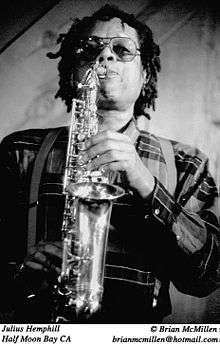Julius Hemphill

Julius Arthur Hemphill (January 24, 1938 – April 2, 1995) was a jazz composer and saxophone player. He performed mainly on alto saxophone, less often on soprano and tenor saxophones and flute.[1]
Biography
Hemphill was born in Fort Worth, Texas,[2] and attended I.M. Terrell High School (as did Ornette Coleman).[3] He studied the clarinet with John Carter,[2] another I.M. Terrell alumnus,[3] before learning saxophone. Gerry Mulligan was an early influence. Hemphill joined the United States Army in 1964, and served for several years, and later performed with Ike Turner for a brief period. In 1968, Hemphill moved to St. Louis, Missouri, and co-founded the Black Artists' Group (BAG), a multidisciplinary arts collective that brought him into contact with artists such as saxophonists Oliver Lake and Hamiet Bluiett, trumpeters Baikida Carroll and Floyd LeFlore, and writer/director Malinke Robert Elliott.
Hemphill moved to New York City in the mid-1970s, and was active in the then-thriving free jazz community. He gave saxophone lessons to a number of musicians, including David Sanborn and Tim Berne. Hemphill was probably best known as the founder of the World Saxophone Quartet, a group he formed in 1976, after collaborating with Anthony Braxton in several saxophone-only ensembles. Hemphill left the World Saxophone Quartet in the early 1990s, and formed a saxophone quintet.[4]
Hemphill recorded over twenty albums as a leader, about ten records with the World Saxophone Quartet and recorded or performed with Björk, Bill Frisell, Anthony Braxton and others. Late in his life, ill-health (including diabetes and heart surgery) forced Hemphill to stop playing saxophone, but he continued writing music until his death[4] in New York City. His saxophone sextet, led by Marty Ehrlich, also released several albums of Hemphill's music, but without Hemphill playing. The most recent is entitled The Hard Blues, recorded live in Lisbon after Hemphill's death.
A source of information on Hemphill's life and music is a multi-hour oral history interview that he conducted for the Smithsonian Institution in March and April 1994, and which is held at the Archives Center of the National Museum of American History in Washington, D.C.
Discography
As leader
- 1972: Dogon A.D. (Freedom)
- 1975: Coon Bid'ness (Black Lion) (re-released in 1995 as Reflections)
- 1976: Live in New York (Red)
- 1977: Blue Boyé (Mbari) (rereleased in 1998 on Screwgun)
- 1977: Roi Boyé and the Gotham Minstrels (Sackville)
- 1977: Raw Materials and Residuals (Black Saint)
- 1978: Buster Bee (Sackville)
- 1980: Flat-Out Jump Suite (Black Saint)
- 1984: Georgia Blue (Minor Music)
- 1988: Julius Hemphill Big Band (Elektra)
- 1991: Fat Man and the Hard Blues (Black Saint)
- 1991: Live from the New Music Cafe (Music & Arts)
- 1992: Oakland Duets (live) (Music & Arts)
- 1993: Five Chord Stud (Black Saint)
- 1995: Reflections (Freedom) [A re-issue of Coon Bid'ness]
- 1997: At Dr. King's Table (New World)
- 1998: Chile/New York: Sound Environment (Black Saint)
Compositions featured on
- 1993: Diminutive Mysteries (Mostly Hemphill) (JMT) by Tim Berne
- 2003: One Atmosphere (Tzadik)
- 2005: The Hard Blues (Clean Feed) by the Julius Hemphill Sextet
With the World Saxophone Quartet
| Title | Year | Label | ||
|---|---|---|---|---|
| Point of No Return | 1977 | Moers Music | ||
| Steppin' with the World Saxophone Quartet | 1979 | Black Saint | ||
| W.S.Q. | 1981 | Black Saint | ||
| Revue | 1982 | Black Saint | ||
| Live in Zurich | 1984 | Black Saint | ||
| Live at Brooklyn Academy of Music | 1986 | Black Saint | ||
| Plays Duke Ellington | 1986 | Elektra / Nonesuch | ||
| Dances and Ballads | 1987 | Elektra / Nonesuch | ||
| Rhythm and Blues | 1989 | Elektra / Nonesuch | ||
| Metamorphosis | 1991 | Elektra / Nonesuch |
As sideman
With Jean-Paul Bourelly
- Jungle Cowboy (JMT, 1987)
With Anthony Braxton
- New York, Fall 1974 (Arista, 1974)
References
- ↑ Allmusic
- 1 2 Bradley Shreve, "HEMPHILL, JULIUS," Handbook of Texas Online, accessed July 26, 2012. Published by the Texas State Historical Association.
- 1 2 Patoski, Joe Nick (2008). Willie Nelson: An Epic Life. p. 50. Retrieved July 25, 2012.
- 1 2 Davis, Francis. "The Julius Hemphill Sextet: At Dr. King's Table". Liner notes. New World Records. (PDF)
External links
- Biography in Handbook of Texas
- His page on the Internet Movie Database
- Tim Berne discusses Hemphill:
- Biography and recordings of his works from the Isabella Stewart Gardner Museum